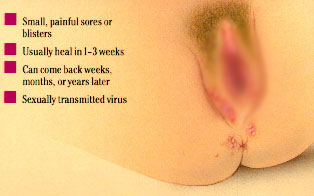Genital herpes is a monster of an STI. It’s highly contagious, latex condoms can’t do much in terms of providing protection, the outbreaks are extremely painful and socially debilitating, plus the virus is believed to be ‘unevictable.’ Meaning it’ll stay with you for life and cannot be evicted.
Moreover, its effect on the human psyche are no less severe (if not more). Because of the misconceptions and myths surrounding genital herpes, people living with genital herpes are prone to emotional stress and depression.
Essentially, the effects of genital herpes are multifaceted and complex. When a person contracts genital herpes for the first time, concerns regarding the physical effects of this STD naturally arise. But what’s often overlooked is the emotional or mental impact genital herpes can have on a person. It’s no exaggeration to say that the mental implications can potentially be more severe than the physical ones.
What is Genital Herpes?

genital herpes, image: wso.williams.edu
Genital herpes is an infection of the genitals, buttocks, or anal area caused by herpes simplex virus (HSV). This virus affects the genitals, the cervix, as well as the skin in other parts of the body. There are two types of herpes simplex viruses: HSV-1 and HSV-2.
Most genital herpes is caused by HSV type 2 and is easily human transmissible. It is passed from one person to another by close, direct contact. The most common mode of transmission is through vaginal, anal or oral sex.
Occasionally, it can cause sores in the mouth, and can be spread by secretions in saliva. Because the virus does not live outside the body for long, you cannot catch genital herpes from an object, such as a toilet seat.
Genital herpes infection is common in the United States. The CDC estimates that, annually, 776,000 people in the United States get new herpes infections. Nationwide, 16%, or about one out of six, people aged 14 to 49 years have genital HSV-2 infection. Over the past decade, the percentage of persons with genital herpes infection in the United States has remained stable.
Genital Herpes Symptoms
Most individuals infected with HSV-1 or HSV-2 are asymptomatic, or have very mild symptoms that go unnoticed or are mistaken for another skin condition. As a result, over 80% of infected individuals remain unaware of their infection. However, if a person does have an outbreak, the symptoms can cause significant discomfort.
Someone with genital herpes may first notice itching or pain, followed by sores that appear a few hours to a few days later. The sores, which may appear on the vagina, penis, scrotum, buttocks, or anus, start out as red bumps that soon turn into red, watery blisters.
The sores might make it very painful to urinate. The sores may open up, ooze fluid, or bleed; during a first herpes outbreak, they can take from a week to several weeks to heal. The entire genital area may feel very tender or painful, and the person may have flu-like symptoms including fever, headache, and swollen lymph nodes.
Although the infection can stay in the body indefinitely, the number of outbreaks tends to decrease over time. Recurrences are much less frequent for genital HSV-1 infection than for genital HSV-2 infection.
If future outbreaks occur, they tend to be less severe and shorter in duration, with sores healing faster.
Cure or treatment for herpes?
It is generally believed that, at present, there is no way to completely eradicate the HSV from our system. The virus will remain dormant in the body and can reappear at any time.
Antiviral medications can, however, prevent or shorten outbreaks during the period of time the person takes the medication. In addition, daily use of antiviral medication for herpes can reduce the likelihood of transmission to partners. Unfortunately, these treatments have their side effects and are inevitably costly.
Aside from the well known conventional treatments, there are some complimentary, homeopathic treatments that are known to be quite effective. Herbs such as Echinacea can help grant relief from different herpes symptoms.
Baking soda aids in drying out moisture from oozing lesions, thus making the blisters disappear sooner.
Lysine which is an essential amino acid may also be used to prevent an outbreak by blocking arginine that plays an important role in the replication of the herpes virus.
Lastly, if you want to find relief from the burning sensation and manage flare-ups, try using a cool tea bag or a reputed brand of aloe vera cream.
These homeopathic treatments are holistic and comprehensive in nature, and they do not carry the same side effects and economical cost associated with taking antiviral medications on a daily basis.
Complications and the Human Psyche
While it’s common knowledge that HSV 1 and 2 can cause serious complications such as blindness, encephalitis, and aseptic meningitis, what’s often overlooked is the fact that people who contract genital herpes have concerns about how it will impact their sex life, and relationships. There can be can be considerable embarrassment, shame, and stigma associated with a herpes diagnosis and this can substantially interfere with a patient’s relationships.
As previously mentioned, accepting the fact that you’ve contracted genital herpes can be very difficult. While reaction may vary, most people experience intense emotions ranging from sadness to anger. Some develop intense feeling of guilt and self-blame, thinking that they ‘deserve’ this infection.
This is enhanced by the fact that herpes is the STD of choice when it comes to ridiculing or embarrassing someone. We hear a lot about STD jokes and how being infected with herpes is considered ‘dirty’ and ‘unclean’ on TV shows, movies and the internet.
We will discuss ways on how you can emotionally cope with genital herpes on our next article. So if you’re living with HSV or if you have friends or relatives infected by HSV, address these concerns by recognizing that while genital herpes truly is a monstrous STD, it is a manageable condition, and that living a fulfilling life is still very much possible.
Take heart, there is still hope!








 Saving...
Saving...
Latest Comments